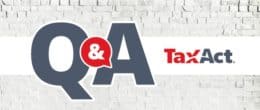What to Do If You’re a Victim of Tax Identity Theft


File your taxes with confidence.
Your max tax refund is guaranteed.
Experiencing tax return identity theft can be a terrifying prospect. Unfortunately, it’s a reality that millions of Americans face each year. To minimize your risk of identity theft, there are several steps you can take that are both practical and effective.
At a glance:
- Protect your personal information by using your Social Security number selectively and choosing strong, unique passwords for accounts.
- File your taxes early to reduce the chances of fraudulent activity.
- Check for signs of identity theft by monitoring credit reports and account statements regularly.
- If you suspect identity theft, take immediate action by filing complaints, contacting credit bureaus, and notifying relevant institutions.
Preventing tax identity theft
One of the most straightforward ways to reduce the likelihood of tax return identity theft is by keeping your personal information private. Here are our top tips for protecting your sensitive information:
- Use your Social Security number (SSN) selectively. Avoid sharing it unless necessary and store your Social Security card in a secure and private place. Additionally, when providing your SSN, do so only on secure websites and never disclose your full SSN over the phone.
- Choose unique passwords for all your accounts and devices. Ensure your passwords are at least 12 characters long and avoid using names or common dictionary words.
- Personalize your passwords and password reset questions for different services and websites. It’s also a good idea to change your passwords periodically throughout the year to minimize the risk of tax return identity theft. Modifying a few characters in your passwords regularly can significantly lower your vulnerability.
- Responsibly manage documents containing personal information. If feasible, lock your mailbox to prevent theft of mail items containing sensitive details like your SSN. When you no longer need documents with personal identification information, shred them thoroughly to avoid potential misuse.
- File your taxes early. Did you know that being among the first to file your tax return discourages fraudulent activity? If you have already filed and someone tries to file a fraudulent return using your SSN, the IRS will reject their return. Once you have received all your tax documentation, such as Form W-2, Form 1099s, and charitable contribution receipts, make it a priority to set aside time for filing your taxes.
How do I check to see if someone is using my Social Security number?
If you want to find out if someone is using your SSN, you can do the following:
- Check your credit report for new accounts, such as a credit card or loan fraudulently opened in your name.
- Check your mail to see if you have any communications or past-due notices from unfamiliar companies. This could indicate that someone opened an account with them using your identity.
- Watch out for calls from debt collectors. If someone is trying to collect on a debt you know nothing about, get as much information as possible to see if the debt they are calling about was opened falsely in your name.
- Follow up if your loan or credit card application is denied even though you thought you had good credit. You may discover some fraudulent activity you were unaware of.
- Review your account statements regularly to check for any unexplained charges. Even small withdrawals from your bank account could signal that an identity thief is testing the waters before doing something even more destructive.
What should I do if I suspect someone is using my identity?
If you suspect that someone is using your identity, take immediate action to protect yourself. Follow the steps outlined in the section below to determine if your identity has genuinely been compromised.
What should you do if you have been a victim of identity theft?
If you become a victim of tax return identity theft, there are several steps you can take to address the situation and make a recovery plan:
- File a complaint: Start by filing a complaint with the Federal Trade Commission (FTC) through their identity theft website. The FTC will initiate an investigation on your behalf.
- Contact credit bureaus: Next, contact the three major credit reporting agencies — Experian, TransUnion, and Equifax — to place a fraud alert on your credit reports. This alert notifies potential creditors to take extra precautions when verifying your identity.
- Monitor your accounts: Carefully monitor your bank accounts, credit cards, and other financial accounts for suspicious activity. If you notice fraudulent transactions, report them immediately to the financial institution.
- Notify relevant institutions: Contact all relevant organizations, such as your bank, credit card companies, and utility providers, to inform them about the identity theft. They can take appropriate measures to protect your accounts and assist you in resolving any fraudulent activity.
- Contact the IRS fraud hotline: Promptly reach out to the IRS. The IRS fraud department will guide you through restoring your identity and assist with any necessary paperwork.
- Complete Form 14039: Commonly known as an Identity Theft Affidavit, this form is processed by the IRS to address any identity concerns during the tax return process. If your e-filed tax return is rejected due to a duplicate filing under your SSN, you can find Form 14039 on IRS.gov, fill it out, and mail it along with a printed copy of your tax return to the IRS for review.
How can a credit report help detect identity theft?
A credit report plays a crucial role in detecting identity theft. Under federal law, you are entitled to a free credit report every 12 months from each credit reporting company (Experian, TransUnion, and Equifax). Note: Due to current economic uncertainty, these reports are available weekly through the end of 2023.
Check your credit file for the following signs:
- Unusual accounts you don’t recognize
- Credit inquiries you did not initiate
- Inaccurate personal information, such as address discrepancies
- Late or missed payments for unknown accounts
- Sudden drastic changes in your credit score
By regularly reviewing your credit report from each major credit bureau, you can quickly pinpoint any signs of identity theft. If you notice any suspicious activity, take immediate action to report and resolve the issue, as we discussed above.
What do I do if debt collectors contact me over fraudulently accrued debt?
If debt collectors contact you about fraudulent debt, request written verification of the debt from the collectors to ensure its legitimacy. If you believe the debt is a result of identity theft, file a police report and provide a copy to the debt collectors. Make sure to notify the credit bureaus about the fraudulent debt and request that a fraud alert be placed on your credit reports. Keep detailed records of all communication with the debt collectors, including dates, times, and names of the individuals you spoke to.
You can also consult an attorney or a consumer protection agency for further guidance on handling and disputing the fraudulent debt.
Stay alert to prevent tax identity theft
Tax refund identity theft impacts millions of Americans each year. However, by taking the appropriate precautions, such as securely shredding personal documents and limiting the exposure of your SSN, you can significantly reduce the chances of experiencing tax return identity theft.






